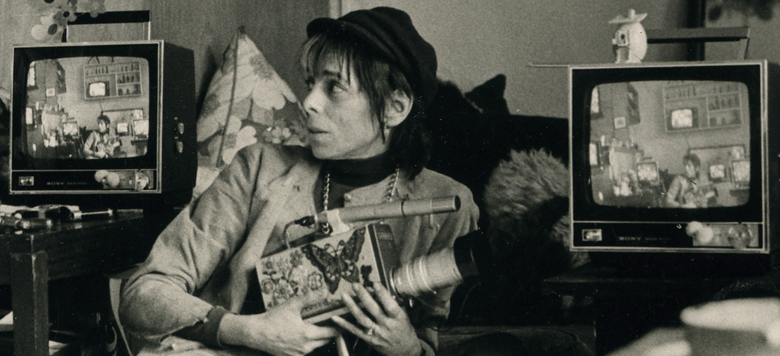Shirley Clarke
Born October 2, 1919 in New York, Shirley Brimberg Clarke danced into the world of art in her teens, studying with such innovative choreographers as Martha Graham, Hanya Holm and Doris Humphrey.
After marrying and having a daughter, Clarke turned her talents to cinema, becoming an esteemed filmmaker at a time when few women worked in the field. Her early shorts reflected her lifelong love of dance along with a growing mastery of the new medium. In her award-winning A Dance in the Sun (1953), In Paris Parks (1954), Bullfight (1955) and A Moment in Love (1957), Clarke captured movement on film in a new way, eschewing close-ups in favor of long takes and innovative editing. An active member and advocate of New York’s independent film community, Clarke later turned her attention to social-issue filmmaking.
For her first feature, Clarke took on an acclaimed and controversial stage play by Jack Gelber. Her adaptation of The Connection (1961) won praise for its graphic, unglamorous depiction of drug use, but embroiled Clarke in a two-year censorship battle, which she ultimately won. Her next film, The Cool World (1964), was a further collaboration with Carl Lee, the African American star of The Connection and Clarke’s long-time romantic partner (until his death in 1986).
In 1963, Clarke directed Robert Frost: A Lover’s Quarrel with the World. Filmed months before the poet’s death, the documentary revealed Frost’s warmth and charm in speaking engagements and at home. Clarke was reportedly unhappy with the final cut, but the film went on to win the Oscar for Best Documentary. Her daughter Wendy writes, “Shirley did consider (it an honor] that she won an Academy Award for this film and even went to Los Angeles to the Awards. She sat just behind Danny Kaye.”
Clarke’s fourth feature, Portrait of Jason (1967), was a completely different kind of project. A pure documentary without adornment, Portrait was created from a single, 12-hour-long interview with Jason Holliday, a gay African American hustler and aspiring nightclub performer. Holliday’s stories of racism, homophobia, parental abuse, drugs, sex and prostitution would have been shocking if not for his candor, humor and acerbic charm. The film was a revelation and remains one of the most respected LGBT films.
Despite the success of Portrait of Jason, Clarke found it increasingly difficult to get financing for her films. From 1975 to 1985 she redirected her talents to teaching film and video production at UCLA. Clarke’s fifth and final feature, Ornette: Made in America was well-received portrait of the eccentric musical genius and a cinematic comeback for Clarke. Once again, she was on the cutting edge of film style, weaving documentary footage, video art, music videos and architecture into a vibrant collage that mirrored Coleman’s groundbreaking jazz. It was her groovy swan song, as Clarke then retired. She died of a stroke in Boston in 1997.
For a director whose films were designed to unsettle audiences, perhaps the most shocking aspect of Clarke’s career is her lack of recognition today. Although acknowledged as a major influence by many current filmmakers, there is not one single book devoted to her work, nor has there been a significant re-release of her films. Milestone’s “Project Shirley” is intended to right this historical oversight by presenting many of Clarke’s best films in beautifully restored versions.
After marrying and having a daughter, Clarke turned her talents to cinema, becoming an esteemed filmmaker at a time when few women worked in the field. Her early shorts reflected her lifelong love of dance along with a growing mastery of the new medium. In her award-winning A Dance in the Sun (1953), In Paris Parks (1954), Bullfight (1955) and A Moment in Love (1957), Clarke captured movement on film in a new way, eschewing close-ups in favor of long takes and innovative editing. An active member and advocate of New York’s independent film community, Clarke later turned her attention to social-issue filmmaking.
For her first feature, Clarke took on an acclaimed and controversial stage play by Jack Gelber. Her adaptation of The Connection (1961) won praise for its graphic, unglamorous depiction of drug use, but embroiled Clarke in a two-year censorship battle, which she ultimately won. Her next film, The Cool World (1964), was a further collaboration with Carl Lee, the African American star of The Connection and Clarke’s long-time romantic partner (until his death in 1986).
In 1963, Clarke directed Robert Frost: A Lover’s Quarrel with the World. Filmed months before the poet’s death, the documentary revealed Frost’s warmth and charm in speaking engagements and at home. Clarke was reportedly unhappy with the final cut, but the film went on to win the Oscar for Best Documentary. Her daughter Wendy writes, “Shirley did consider (it an honor] that she won an Academy Award for this film and even went to Los Angeles to the Awards. She sat just behind Danny Kaye.”
Clarke’s fourth feature, Portrait of Jason (1967), was a completely different kind of project. A pure documentary without adornment, Portrait was created from a single, 12-hour-long interview with Jason Holliday, a gay African American hustler and aspiring nightclub performer. Holliday’s stories of racism, homophobia, parental abuse, drugs, sex and prostitution would have been shocking if not for his candor, humor and acerbic charm. The film was a revelation and remains one of the most respected LGBT films.
Despite the success of Portrait of Jason, Clarke found it increasingly difficult to get financing for her films. From 1975 to 1985 she redirected her talents to teaching film and video production at UCLA. Clarke’s fifth and final feature, Ornette: Made in America was well-received portrait of the eccentric musical genius and a cinematic comeback for Clarke. Once again, she was on the cutting edge of film style, weaving documentary footage, video art, music videos and architecture into a vibrant collage that mirrored Coleman’s groundbreaking jazz. It was her groovy swan song, as Clarke then retired. She died of a stroke in Boston in 1997.
For a director whose films were designed to unsettle audiences, perhaps the most shocking aspect of Clarke’s career is her lack of recognition today. Although acknowledged as a major influence by many current filmmakers, there is not one single book devoted to her work, nor has there been a significant re-release of her films. Milestone’s “Project Shirley” is intended to right this historical oversight by presenting many of Clarke’s best films in beautifully restored versions.
© 2012 Milestone Film and Video. All rights reserved.


